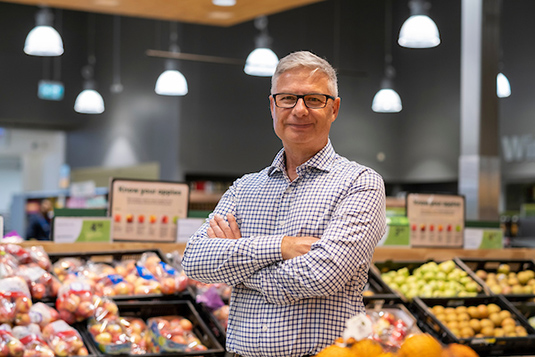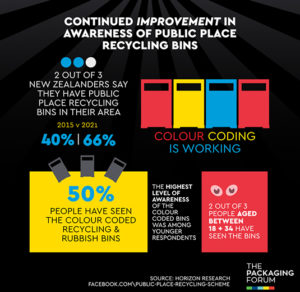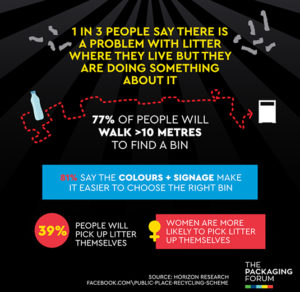Funding application for 2024 – 2025 are now open Apply Now
Member Portal
Not a member? Join us here
Our 2020-2021 annual report, which looks at the Forum’s performance, activities and plans for the future, is now available to read.
18 August 2021
The report also looks at the work of our two accredited product stewardship schemes for container glass, and soft plastic as well as our technical advisory groups, advocacy work, collaborations and more.
A grant from The Packaging Forum has helped the Far North Environment Centre greatly reduce the volume of compostable and recyclable material from the Kaitāia Market going to landfill.
10 August 2021
The Centre has used their recent grant of $9,500 to provide bins for food waste, compostable packaging and recyclables at the market since the beginning of July.
The Centre’s Plastic Free Kaitāia Co-ordinator Waikarere Gregory says they began the project to coincide with Plastic Free July and collected two 60l bags of compostable material at one market alone, despite the poor weather. Previously only a general rubbish bin was available.
“It’s been a great success, reducing waste in the council landfill bins by up to 75% each week,” she says.
The compostable material collected from the market goes towards creating compost by KaitāiaCycle a collaboration with Good Life Projects (which works with youth and adults with intellectual disabilities to create bountiful gardens), CBEC Ecosolutions and Earthcare, Waikarere says.
The Centre identified the need for bins after running a trial at the market and found a strong zero-waste contingent, with most stalls using compostable or recyclable packaging. The trial also found many members of the public were keen to reduce waste to landfill, but a lack of bins meant compostable or recyclable material was going in general rubbish bins, she says.
“We’re also going to work with stallholders to help them move toward better packaging options that can be either recycled or composted, and ideally work towards a reusable system.”
The Centre took a zero-waste approach to the entire operation with the reusable bin liners sewn by local group Anō Anō Clothing Rescue, from old shower curtains, flags and material, Waikarere says.
She also uses an e-bike and trailer, on some days, to transport some of their gear to and from the market.
“We are currently looking for someone to employ to oversee the bins, but in the meantime are managing a roster system with our current contractors,” she says.
The Packaging Forum CEO Rob Langford says the Forum also supplied the Centre with a bin stand and signage from the Litter Less Recycling More project it was involved with to help make the bins more visible and prevent them toppling in high winds.
“We thought this was a great project because it not only keeps recyclable and compostable material out of landfill but helps with educating the public around putting waste in the right bins and not just choosing landfill as the default option,” he says.
The country’s largest packaging industry group has welcomed Government’s move to phase-out difficult-to-recycle and some single-use plastics.
29 June 2021

The Packaging Forum CEO Rob Langford says the Forum, and its Soft Plastic Recycling Scheme (SPRS), had largely supported the proposal during its consultation period, and were pleased to see Government take the next step.
“There was a long consultation period, as there should be, and it’s great to see Government moving forward. It’s essential there are end-of-life solutions in place for packaging and in the case of the plastic types being phased out that is not the case.
“Oxo-degradable plastics are a prime example as they are neither recyclable or compostable,” Rob says. He added that it’s important to note bio plastics (often referred to as ‘compostable plastic’) will also be part of the single-use plastic item phase-out.
The Forum cautioned against the phase-out causing unintended consequences. As industry moves to alternative materials there must also be the development of recycling, reuse and other end-of-life solutions for these materials, as well as consideration around food safety, Rob says.
“We are therefore urging care when choosing alternatives,” he says.
Rob pointed out alternative materials, such as compostable and fibre (paper and cardboard) packaging also have challenges, especially when we consider New Zealand’s focus on a low-emissions and zero waste economy.
“Our Compostable Technical Advisory Group is currently developing a use-case for New Zealand and is busy consulting with industry and stakeholders,” Rob says.
Moving to alternative materials is a major undertaking for a lot of manufacturers, importers and retailers, he says.
The Forum’s submission during the consultation period called for a full cost benefit analysis, which follows Treasury guidelines, to assess impact on business, food safety, shelf life and cool-chain (particularly for export items).
“That’s where the $50 million Plastics Innovation Fund announced by Government is therefore very welcome and will be vital in helping industry transition and overcome challenges. We are watching with interest to see how those funds will be allocated and excited to see what innovative solutions are developed as a result.”
Phase-out timeline:
By late 2022:
By mid-2023:
By mid-2025:
Public recycling bins have made their first appearance in an Upper Hutt park thanks to help from The Packaging Forum.
25 June 2021
Maidstone Max – Tō Tātou Papa Tākaro, which was recently redeveloped by the Upper Hutt City Council, has been kitted out with four colour-coded public place recycling and rubbish bins. This, thanks in part to a $5,400 grant from the Forum.
Council Waste Minimisation Officer Richard Schouten says the bins take glass, mixed recycling and general waste. “Maidstone Max – Tō Tātou Papa Tākaro is Upper Hutt’s premier adventure play space, and is a great example of putting a waste minimisation lens across a large public infrastructure project.
“These recycling bins are a first for an Upper Hutt public park and the feedback so far has been overwhelmingly positive. The young people in our community are in tune with sustainability and waste minimisation and it’s been exciting to see them embrace the new recycling bins in their shared social spaces.”
Richard says the bins’ standardised colours make it easy for the public to use them correctly. These bins are seen across many other districts throughout the country, so the public instantly recognise what they are.”
The packaging Forum CEO Rob Langford says the colour-coded bins were originally designed as part of the Litter Less Recycle More project, but are available through the Forum’s bin partner Tilley Bins to anyone wanting to install the well-recognised system. There are now over 160 sets of these bins in 18 regions, he says.
“We are thrilled to have the bins we designed as the first in a park in Upper Hutt,” Rob says. “They were designed to make recycling easy and we’ve found that they work very well.”
The park was reopened at the end of a nine-month redevelopment which included a remodelled playground, wheelchair access, state-of-the-art skate park, pump track and half basketball court among its features and attractions.
The Packaging Forum is working with other key stakeholders (including composters) on resolving the issues surrounding compostable packaging. This consultation is a critical part of our collaborative work programme to progress solutions for this packaging type.
Published 3 June 2021
Consultation closes 30 June 2021
Compostable packaging has significant value in the packaging system in specific applications where it can bring nutrients to composters for composting, thus diverting organic waste from landfill. Globally, diverting wasted food from landfill is a priority. In New Zealand (NZ), our Climate Change Commission recently declared organic recycling a top priority for reducing carbon emissions in the waste industry, alongside capturing more methane from landfills.
“Compostable packaging” incorporates a wide range of material types used in a variety of applications. However, some applications are not globally considered as best practice for the generally accepted “use case” for compostable packaging.
In this consultation document we aim to discuss:
Consultation closing date: 30 June
Download the consultation document
How to make a submission
Simple submissions with answers less than 50 words per question may be submitted through our online survey.
For more detailed submissions, please email your submission, preferably in a word document.
Emailed submissions will need to include the following information:
Email your detailed submission
Next steps
Following the closing of the consultation, we will be analysing the results and publishing a summary document which will include recommendations.
Frucor Suntory has introduced cardboard packaging for its multipacks of Pepsi, Pepsi Max, Mountain Dew and 7UP.
04 May 2021
The change is one of several the Australasian beverage company has undertaken to help achieve its sustainability goal of zero waste to landfill by 2030.
The cardboard replaces shrink wrap and will remove 2.7 million pieces of plastic from going to landfill each year as well as making it easier for customers to recycle the packaging.
Read more here.
DB Breweries has set a list of ambitious sustainability targets alongside the launch of its 2020 Sustainability Report.
03 May 2021
The company has announced it aims to use only energy from renewable sources, reach zero waste to landfill in production, and balance all of the consumed volume of water it uses, by 2030.
Read more at dbsustainability.co.nz
A recent survey on public place recycling and litter has seen a mixed bag of results, with awareness around public bins increasing but willingness to make extra effort to use them declining.
07 April 2021
The survey, conducted in early March by Horizon Research for The Packaging Forum, also found more people believe there is a problem with litter where they lived, compared with a year earlier.
The survey spoke to over 1,200 people about public place recycling and rubbish bins and found the number of people who have access to public bins continued upwards to 2.4 million adults (66% of respondents). This was an increase of 2% on 2020 and 25% from the first survey in 2014.
Bins to make recycling easier, better
The Packaging Forum CEO Rob Langford says they have been working over recent years to rollout new colour-coded bins which help making recycling and disposing of rubbish easier to get right.
“There are a lot of people who want to do the right thing and recycle, but don’t have the information to do so correctly which causes unintended contamination issues. With the right information they have the potential to have a hugely positive impact.”

While awareness of these colour-coded bins declined slightly to 50%, it was still well up from 37% in 2019.
“The Covid-19 pandemic has had an impact and the research shows a drop in awareness where the bins were removed during lockdown but have not been returned,” Rob says.
It was very encouraging to see awareness was highest among people aged 18 to 24, he says. “Those aged 75 and over had just as much awareness, so it’s the group in the middle where more focus is needed.”
The colour-coded bins have continued to be very effective, Rob says, with 81% of people reporting they made knowing what to recycle and what to put in the rubbish easier. “This has been the consistent response over the past three years, so the design is working.”

More litter, less effort
He says it was interesting to see that while litter was perceived as more of a problem, with 34% people agreeing it was (up 5%), individuals were less likely to make an extra effort to use public bins. The report showed 28% of people would walk more than 40 metres to find a bin, down from 37% in 2020.
However, while attitudes towards telling someone else to pick up litter they had dropped changed little from 2020, people were slightly more likely to pick up litter themselves – up 3% to 39%.
Dole has introduced new packaging for its Bobby Bananas which will reduce the amount of plastic going to landfill by some 16 tonnes.
25 March 2021
The new packaging was featured recently in FMCG magazine.
The new tape on the bananas can also be dropped off with other soft plastic at Soft Plastic Recycling Scheme drop off points.
Cottonsoft’s Paseo 360° packaging has the circular economy at the core of its design.
17 March 2021
Cottonsoft’s work on greater packaging sustainability was featured recently in FMCG magazine.
The Paseo 360° range now features recyclable paper packaging which is sustainably sourced, and a core made from 100% recycled NZ cardboard.